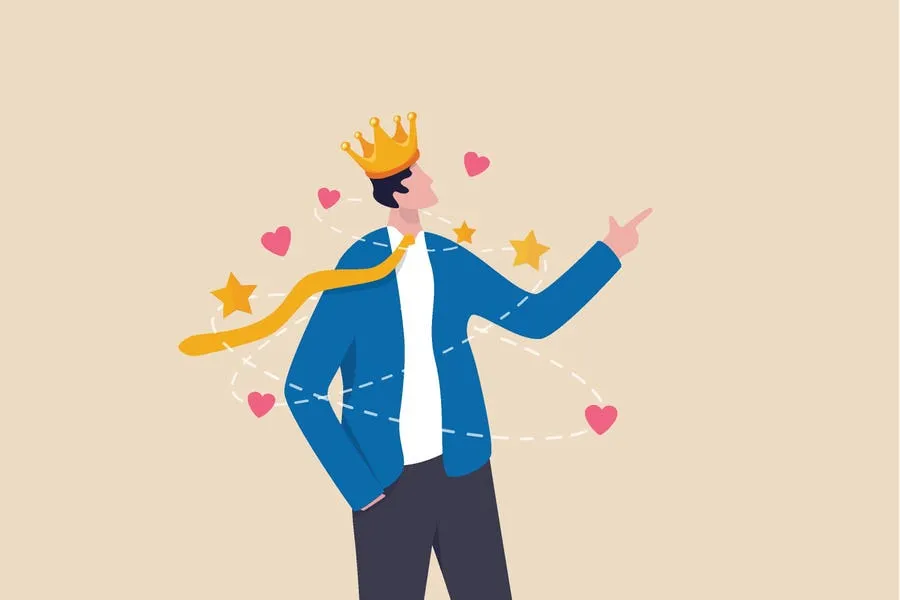If you've ever been in a relationship with someone high in narcissistic traits, you can likely attest to the fact that their version of "love" feels much different to what we're taught it should look like. It's intoxicating. It's confusing. And, most of all, it's destabilizing.
You may already know that grandiose narcissism is characterized by:
In this sense, when a narcissist says "I love you," it may, most times, not mean what most other people mean. Their love tends to serve their own needs first and foremost, and above all others'. However, most partners won't realize this in the early stages of a romantic relationship.
This is because, as a 2017 study from the Journal of Personality and Social Psychology notes, narcissists may seem like very appealing partners, but only in the short-term. As magnetic as they may seem in the beginning, relationships with them are almost always volatile -- and, in the end, they'll likely leave you devastated.
Yet, despite all the harm that can come from these relationships, many people nevertheless find themselves drawn to narcissists' irresistible charm. Understanding how a narcissist "loves" is therefore the first step to stopping yourself from mistaking their manipulation for affection.
Here's two ways that narcissists express what they might call "love."
A hallmark feature of a relationship with a narcissist is the sheer intensity of the early stages. While some would call it a "whirlwind romance," research from the Journal of Family Theory & Review notes that this is actually the product of "idealization."
Simply put, this is the period when a narcissist showers their partner with admiration, gifts, bold declarations of love and devotion -- or anything, really, that it takes to win them over.
Imagine, for instance, someone telling you after only one or two dates that they're convinced that you're their soulmate. They tell you that they've never felt this way before; that you’re the most extraordinary person they’ve ever met; that there’s no one else like you; that you’re perfect for them. It sounds like a fairy tale, until you’re reminded that you’ve only just met.
Although there’s minimal existing research on this phenomenon, both psychologists and clinicians globally know it well: love-bombing.
The message behind these grand displays isn’t one of intimacy or love. Love-bombing, by design, serves purely to expedite attachment. The narcissist floods you with positive reinforcement, and, as a result, they can effectively bypass the natural process of relationship formation.
The most crucial caveat to recognize is that sweet nothings aren’t actually for you, despite how convinced you might be of it. In reality, it’s for them.
To the narcissist, you’re a mere representation of their own worth. Their idealization of you is, by extension, an act of idealizing themselves. In other words, the “love” you’re receiving is a means to an end -- the end being to get what they want, which is you.
The tragedy, of course, is that the pedestal they put you on is never permanent. Once they do, indeed, get what they want, the narcissist’s affection usually begins to grow cold. This is because the intensity was never meant to last in the first place. They only needed it to secure your devotion to them.
Once love-bombing eventually loses its novelty, narcissists then resort to expressing their “love” through ownership. In their eyes, a partner could never be an equal collaborator, as they’re inferior. A partner, instead, is a prized possession that exists to reinforce their own superiority.
At this stage, the narcissist’s sense of entitlement becomes hard to ignore. They often convince themselves that, because they “chose” you, you owe them: allegiance, loyalty, favors or anything that ingratiates their already overinflated sense of self.
Acts of “love” can actually look quite sweet in these initial stages. For instance, they may insist on having access to your location at all times and knowing who you’re with, all so that they can “protect” you. Soon, however, their protectiveness will start to look more and more like possession.
Of course, they usually retort that they’re only doing these things -- telling you what you’re allowed to wear, when you’re allowed to go out and who you’re allowed to go out with -- because of how much they “care” about you. Then once these behaviors escalate, they’ll say they’re only discouraging you from spending time with friends, family or leaving the house at all because outsiders “don’t understand” your relationship.
The ultimate drive behind these behaviors is an insatiable desire for control. As 2018 research from The Journal of Psychology notes, both grandiose and vulnerable narcissists are not above emotionally manipulating others outright in order to achieve their aims and goals. And in a romantic relationship, the goal is usually to maintain power.
To the partner, their possessiveness and protectiveness may come across as passion, or perhaps even as unwavering commitment. But, in time, it soon becomes clear that when a narcissist says, “I can’t stand the thought of losing you,” they might as well be saying,“You’re mine, and I don’t plan on sharing you.”
In such situations, they’re holding on to you tightly as a source of validation, which often looks like isolating you and ensuring you don’t have other support systems to rely on.
As blatantly controlling and manipulative these habits look on paper, they may feel incredibly seductive in reality. In fact, even outside of the context of narcissism, partners may misinterpret jealousy as a signal of devotion.
But if a narcissist successfully makes control a core theme within a partnership, you’ll soon be rid of your independence and autonomy—all while believing that this is just their unique way of loving you.
Narcissistic “love,” in this sense, serves to constrict you. It demands obedience while forcing you to bend to its will. This, of course, isn’t real or healthy love. Real love, on the other hand, is a celebration of individuality and freedom; it’s kind; it’s unconditional and it never asks too much of you.
